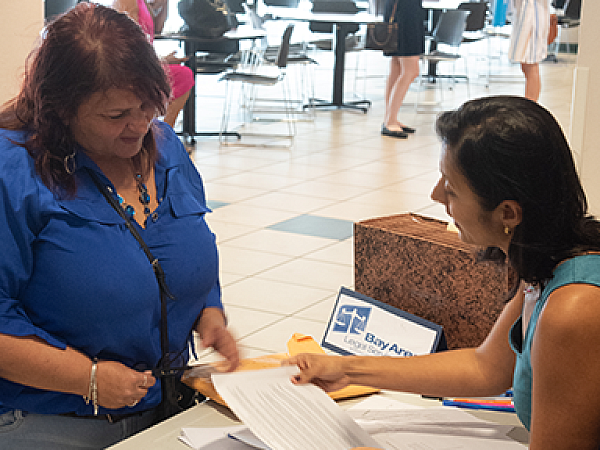Hearings & Trials: 7 Things You Need to Know
A motion or petition is a request for the court to make a decision.
A hearing or trial is the time when the court (a judge, general magistrate, or a hearing officer) makes the decision on a party’s motion or petition.
Generally, motions are decided at a hearing and petitions are decided at a trial.
The person making the decision on what is granted or denied will be either a judge, a general magistrate, or a hearing officer (referred to here as “the court”).
Things you need to know to prepare:
1. Decision
A hearing/trial is a meeting with the court and both parties where the court will consider evidence that both sides present and will make a decision (possibly that day, possibly later).
2. Hearings vs. Trials – What's the Difference?
A hearing is any court session in which legal argument and/or evidence is presented to determine some issue of law or fact or both issues of law and fact. A hearing is usually a brief session involving a specific motion or question at some time prior to the trial itself. Hearings on motions are usually shorter and less formal than a trial. However, at least one motion is more like a trial (or mini-trial). A motion for contempt requires a party to present evidence to prove that someone has not complied with a judgment or court order.
A trial is a court session in which primarily evidence is presented to the court so the court can determine some ultimate issue in the case. Legal argument may also be made at a trial.
3. Judges, General Magistrates & Hearing Officers – What's the Difference?
Judges, magistrates and hearing officers all administer oaths, conduct hearings, which may include taking of evidence and taking testimony from both parties, and make decisions. A hearing in front of a general magistrate or hearing officer is not mediation. General magistrates/hearing officers are appointed to help manage the caseloads of the circuit judges. Hearing officers hear child support cases. General magistrates hear cases dealing with issues other than child support.
General magistrates: When a case is referred to a general magistrate an Order of Referral will be signed by the judge and issued to the parties. A referral to the general magistrate requires the consent of all parties. You are entitled to have this matter heard by a judge. If you do not want to have this matter heard by the general magistrate, you must file a timely written objection to the referral. After a general magistrate hearing, a written report and recommendation that contains findings of fact, conclusions of law, will be sent to the parties. The report and recommendation is held for a time period and either party shall have that time period to file exceptions to the report if they choose. If no exceptions are filed, the order is sent to the judge for signature and it becomes a court order.
Hearing officers: If the matter concerns child support only, such as a contempt and enforcement, the matter is heard by a hearing officer, there is no referral for child support issues, and therefore this cannot be objected to. After a child support hearing with a hearing officer, the report and recommendation is immediately sent to the judge for signature and it becomes a court order. To challenge an order from a support hearing officer, a party may timely file a motion to vacate the order.
4. Evidence
The court can NOT investigate the case. The court can NOT call witnesses or present evidence. It is your responsibility to present admissible evidence at a hearing/trial to support what you’ve requested in a motion/petition or to defend against what the other party has requested in their motion/petition. Evidence can be witness testimony, testimony of you and/or the other party, documents, photographs, objects, etc.
Admissible evidence is evidence that the court is allowed to consider under the rules of evidence (See Florida Statutes, Chapter 90). For example, letters from non-parties and repeating what a non-party told you (unless they are present in court to testify) generally are hearsay and are not admissible in court. However there are many exceptions to the hearsay rule and admissibility of evidence should be researched before your hearing or trial.
5. Time
Generally, you have half of the time scheduled to present your evidence. If the hearing is scheduled for 30 minutes, each side has roughly 15 minutes to present their evidence to support their request.
6. Case Management
Case management conferences are hearings scheduled by the court to determine the status of the case. Generally, case management conferences are not hearings where decisions on motions or petitions will be made.
7. Notice
If you are scheduling a hearing, it is your responsibility to notify the other party. You are required to send a Notice of Hearing to the other party at the last address in the court file (it's a good idea to also send to all other known/possible addresses) and to list all addresses used for the other party on the Notice of Hearing. If you are the other party, it is your responsibility to keep your address current in the court file. All documents filed by you should state your current address.
Upcoming Legal Clinics
Apply for Services
Apply by phone Monday-Friday, 9 a.m.-4:30 p.m., or apply online anytime for non-emergency legal matters. Language interpreters are available to you at no cost.
Bay Area Legal Services
If you live or have a case in Hillsborough, Pasco, Pinellas, Manatee, or Sarasota counties, we may be able to help.
Statewide Legal Helplines
If you live or have a case in Florida, we may be able to help.
